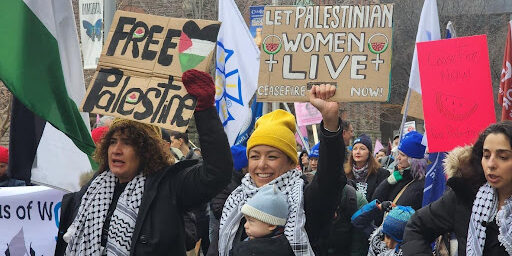On a gloomy March Saturday morning in Toronto, Gloria Turney, personal support worker and Service Employees International Union steward, lit up the hall and received thundering applause from IWD Toronto rally revelers in response to her welcome reminder that “When we fight, we win.” Turney also gave several examples, including the recent repeal of Ontario Conservative’s wage suppression Bill 124. Turney cautioned that these wins don’t happen easily or by acting alone. Women need to continue working together, strengthen political will and build political power if what we want is justice for all.
However, while there are big wins to celebrate, (including the move by France to enshrine abortion rights into their constitution) the decline of women’s rights and increase in human rights violations against women, trans, gender queer people around the globe grows like an untreated metastasizing cancer.
Carolyn Ferns, public policy and government relations co-ordinator for the Ontario Coalition for Better Child Care and co-organizer of this year’s event agrees. For that reason, “The [IWD] coalition keeps growing… there are more people and organizations joining all the time, representing diverse concerns and interests. We are increasingly seeing the interconnectedness of all the issues being brought in. In addition to international struggles, there are local struggles like the recent attacks on trans women and trans rights in Canada. Today, we are also hearing from anti-poverty activists and housing activists. Everything is interconnected.”
One of Canada’s most well-known feminist, activist, educator and writer Judy Rebick said this year’s rally and march represents “One of the most diverse gatherings in the city for sure,” adding “IWD used to focus on whatever ‘women’s’ issue was front burner, for example racism or daycare or the Eaton’s strike. Now with the participation of a wide diversity of women, the focus is on international issues and women internationally and intersectionally.”
Central to this year’s rally was the ongoing Palestinian genocide and in particular, the war’s under reported impact on Palestinian women and children. Over 70 per cent of the people massacred in Palestine so far were women and children. Julian Arscott, Ontario Public Service Employees Union (OPSEU) executive board member, attended the rally with his two-year-old daughter. “[The media] is totally biased and I think there has not been enough coverage of the impact on women and children. It’s so bad that they are complicit in what’s going on.”
In a recent statement, the UN expressed “…alarm over reports of deliberate targeting and extrajudicial killing of Palestinian women and children in places where they sought refuge, or while fleeing. Some of them were reportedly holding white pieces of cloth when they were killed by the Israeli army or affiliated forces.”
In her rally speech, Tamara Abu-Abed, of the Palestinian Youth Movement condemned the war in Gaza and concluded “We reject any feminism that is not anti-imperialist.”
Anna Lippman, member of the steering committee for Independent Jewish Voices (IJV) added “My feminism is incomplete without Palestinian women.”
While some IWD events feature experts or leaders of organizations, Toronto’s IWD rally amplified the voice of grassroots organizations. Other groups that performed or spoke at the rally included Dr. Catherine Brooks, Anishnawbe Kwe Elder, Susan Gapka, founding member and chair of the Toronto Trans Coalition Project, Sharlene Henry, co-chair of the York South-Weston Tenant Union, and Sultana Jahangir, South Asian Women’s and Migrants’ Services.
The Red Bear Singers, a local Indigenous women’s drumming circle made up of residential school survivors played a unity song followed by a Cherokee morning song that was sung by those who walked the 700 kilometer stretch of Highway 16 in remembrance of missing and murdered indigenous women and girls.
How to become more involved in movements for justice, equity and fundamental change? Ferns says there are more and more opportunities to engage. “There are a lot of groups organizing…. because an attack on one is an attack on all, and attack on one woman is an attack on all women. When you see injustice stand up against it, I think that’s the most important thing.”
Hence this year’s slogan, No One Is Free Until All of Us are Free.



